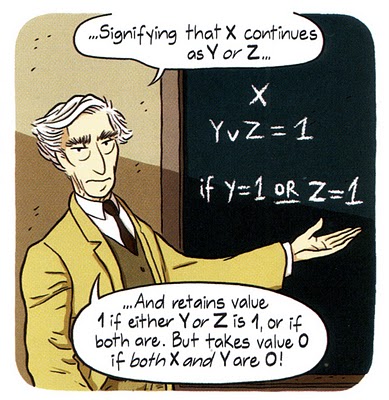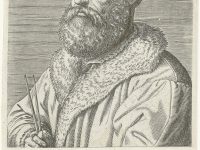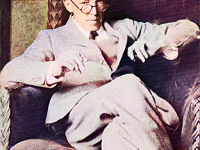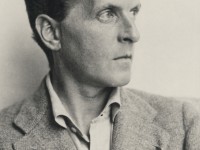
Bertrand Russell from the Graphic Novel ‘Logicomix – The Epic Search of Truth’
On July 11, 1906, mathematician and philosopher Bertrand Russell was suspended from Trinity College, Cambridge due to his engagement in pacifist activities. The remarkable Bertrand Russell, a philosopher, logician, mathematician, historian, and social critic was best known for the famous ‘Principia Mathematica‘, which he published along with Alfred North Whitehead between 1910 and 1913.
“Pure mathematics consists entirely of assertions to the effect that, if such and such a proposition is true of anything, then such and such another proposition is true of that thing. I.”
— Bertrand Russel [9]
Born into a Prominent Family
Bertrand Russel was born into a prominent family in Britain and differentiated thinking was passed on to him by his parents, who were very much ahead of their time and often positioned themselves politically against any expectancy. Unfortunately, his parents passed away soon. He grew up with his grandfather, who was the Prime Minister of Great Britain and his more dominant grandmother, who in contrast to his father John was truly religious, but still had liberal views on many topics, such as Darwinism. Her believes and principles had a great impact on Russell, such as her admiration for rules and definitions, which reflect Russel’s later interest in logic.
Making Mathematics First Priority
Also he could benefit (at least scientifically) from the many home teachers his grandmother hired, especially from his math teacher who was the first to introduce him to Euclid’s theories.[2] Because of him being rather lonely in his childhood, Bertrand Russell had much time to educate himself and made mathematics to his first priority in life. Russell received a scholarship from Cambridge University, his father’s alma mater, and studied mathematics there from 1890 to 1894. However, he always missed finding the real truth of mathematics, i.e. the one thing in mathematics, you can rely on and you can build upon. Later he was awarded a Fellowship, which enabled him to conduct research from 1895 to 1901 without any teaching duties.
Tracing Back all Mathematics to a Set of Axioms
Through his later first wife Alys Pearsall Smith he also occupied himself with philosophical studies. He is now seen as one of the founders of analytic philosophy and was greatly influenced by Gottfried Wilhelm Leibniz.[3] Several meetings with George Edward Moore cleared up his mind and introduced him to the field of logic. At a mathematical congress in 1900, Russell met the Italian logician Giuseppe Peano and his work. Russell adopted Peano’s methods, expanded them and thus laid the foundation for Principia Mathematica, an attempt to trace all mathematics back to a limited set of axioms and concluding rules. Work on this monumental work lasted from 1902 to 1913, when the third and last volume appeared. Russell wrote Principia Mathematica together with Whitehead, who temporarily lived with his family at Russell’s house.
The Foundations of Mathematics
In the early 1900’s, Russell began his study on the foundations of mathematics, became a member of the Royal Society and published the first of the three books of ‘Principia Mathematica‘ along with Whitehead. The first book dealt with set theory, cardinal numbers, ordinal numbers, and real numbers. Towards the end of their work the authors made clear that all known mathematical principles can be developed from the formalism depicted above.
Meeting Wittgenstein
In 1911 Russell first met the Viennese philosopher Ludwig Wittgenstein,[4] who had studied at Cambridge, and made friends with him. Through the years, Russell could make up a great reputation for himself in many scientific areas, always questioning and seeking for the ‘real’ truth. He developed theories on society and distributed his clear religious convictions. A decisive event in Russell’s life was the First World War. From 1914 Russell suspended his mathematical research and began to work as an activist and author for peace and conscientious objection. The fact that he had been fined for a leaflet prompted Cambridge University to withdraw his professorship. He was later sentenced to six months in prison for considering in an anti-war service magazine the possibility of US soldiers being used as strikebreakers in England. However, Russell was allowed to read and write in prison, and so he wrote several books during his imprisonment. After the book Introduction to Mathematical Philosophy (1919), written in prison, in which he mainly explains earlier works and their philosophical significance, Russell turned away from problems of mathematics and logic.
The Nobel Prize in Literature
Unlike World War I, Russell did not take a pacifist position in World War II. Shortly after the end of the war he even spoke out in favour of a preventive war against the Soviet Union, which did not yet have nuclear weapons. He wanted to prevent a nuclear war that would destroy humanity. In 1949 Russell received the Order of Merit, and in 1950 he was awarded the Nobel Prize for Literature, especially for marriage and morality, for which he had been strongly criticized a few years earlier.
“Real life is, to most men, a long second-best, a perpetual compromise between the ideal and the possible; but the world of pure reason knows no compromise, no practical limitations, no barrier to the creative activity embodying in splendid edifices the passionate aspiration after the perfect from which all great work springs”
— Bertrand Russel, The Study of Mathematics” (November 1907)
Withdrawing from Public
Russell, who was 78 years old and has received many awards worldwide, did not withdraw from the public after 1950. It was above all a possible Third World War that moved him as a great danger for mankind. He was the driving force behind the Russell-Einstein Manifesto and acted as mediator between the heads of state in various political crises during the Cold War. In 1963 he founded the Bertrand Russell Peace Foundation. At the Russell Tribunal, he investigated US war crimes in Vietnam.
Bertrand Russell died of influenza on 2 February 1970 at the age of 97 in Penrhyndeudraeth (Wales).
Logicomix: An Epic Search for Truth, [10]
References and further Reading:
- [1] A. Papadatos, A. Doxiadis, C. Papadimitriou: Logicomix – The Epic Search for Truth, Bloomsbury (2009)
- [2] Euclid – the Father of Geometry, SciHi Blog
- [3] Let Us Calculate – the Last Universal Academic Gottfried Wilhelm Leibniz, SciHi Blog
- [4] The Philosophy of Ludwig Wittgenstein, SciHi Blog
- [5] Bertrand Russel at Wikidata
- [6] Bertrand Russel at zbMATH
- [7] O’Connor, John J.; Robertson, Edmund F., “Bertrand Russell“, MacTutor History of Mathematics archive, University of St Andrews.
- [8] Bertrand Russel at Mathematics Genealogy Project
- [9] Bertrand Russel, Recent Work on the Principles of Mathematics, published in International Monthly, Vol. 4 (1901), later published as “Mathematics and the Metaphysicians” in Mysticism and Logic and Other Essays (1917)
- [10] Logicomix: An Epic Search for Truth, BloomsburyUSA @ youtube
- [11] Zalta, Edward N. (ed.). Bertrand Russell – The Stanford Encyclopedia of Philosophy. Metaphysics Research Lab, Stanford University – via Stanford Encyclopedia of Philosophy.
- [12] Kimball, Roger (September 1992). “Love, logic & unbearable pity: The private Bertrand Russell”. The New Criterion.
- [13] A. J. Ayer. Bertrand Russell, New York: Viking Press, 1972
- [14] John Lewis. Bertrand Russell: Philosopher and Humanist, London: Lawerence & Wishart, 1968
- [15] Timeline for Bertrand Russel, via Wikidata





